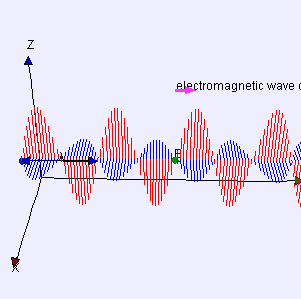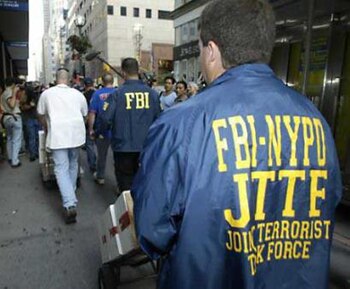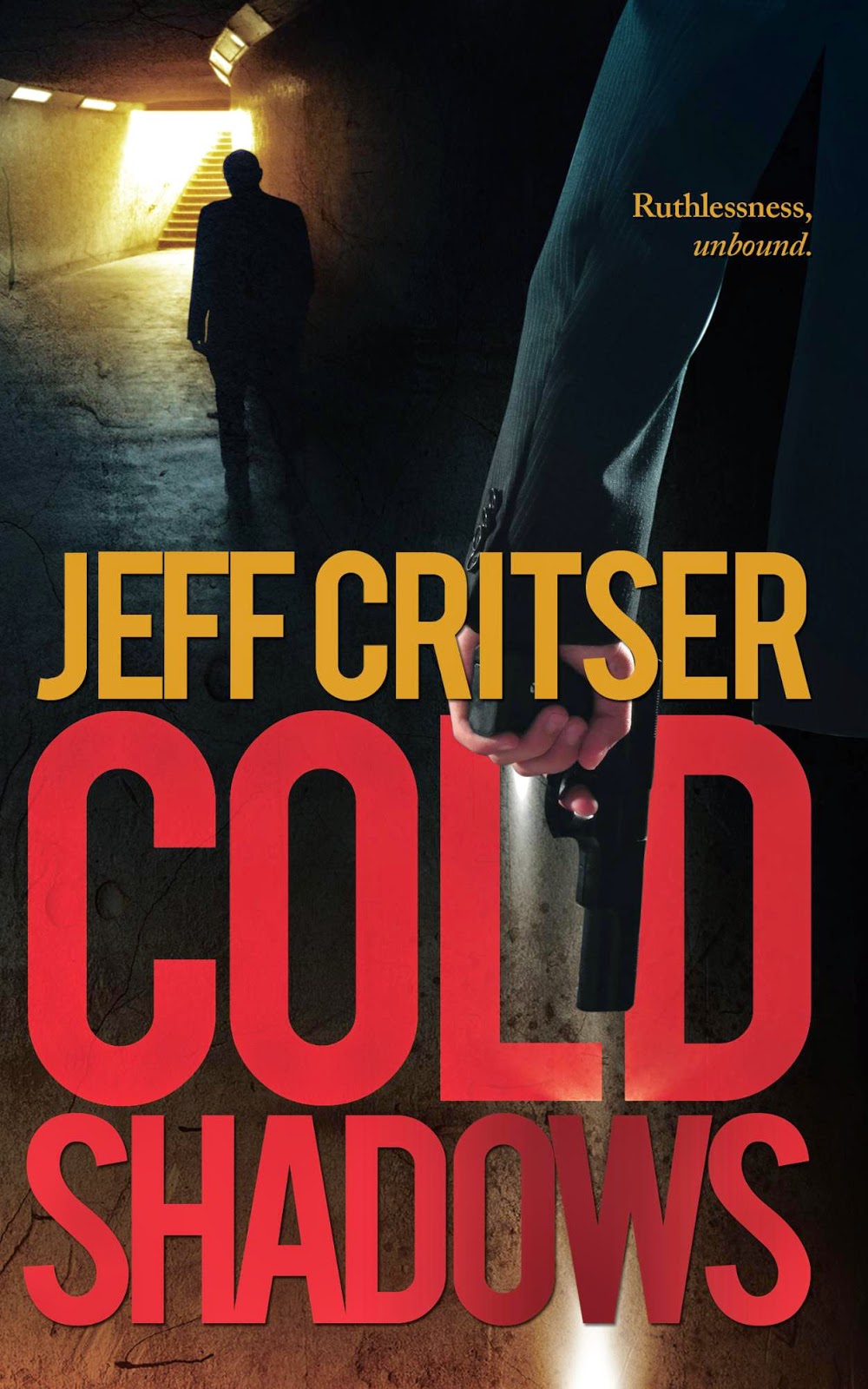| English: Electromagnetic waves can be imagined as a self-propagating transverse oscillating wave of electric and magnetic fields. This diagram shows a plane linearly polarized wave propagating from left to right. The electric field is in a vertical plane and the magnetic field in a horizontal plane. http://weelookang.blogspot.com/2011/10/ejs-open-source-propagation-of.html (Photo credit: Wikipedia) |
Jeff, can you tell me your professional background and how your background feeds your prose - what do you write?
Jeff -
The two things I could really call 'my profession' would be the US Army, and a technical support agent.
I spent 5 years in the Army doing comms work before I left to go to school. I went to school for journalism, and even won some big awards, but the inherent dishonesty of reporting was too much for me. Plus, I suck at school.
From there I fell into working tech support. I was young enough that I knew more about computers than the people older than me and in the 90s that was enough.
I worked that until 2011 when illness prevented me from talking on the phone for very long. Most of my tech support was phone based, I worked in call centers.
So how does this feed my prose? When I was a kid... let's say 'I had a bad childhood' and I didn't really have parents in any meaningful way. I loved Spiderman and Star Trek, and I used to write what we call fan fic now, but back then with no internet, it was just me dodging homework to go live in another world.
Of course, I read everything. Sci-fi, fantasy, as long as it was fantastical, I loved it. A few years ago, after being out of work for 4 years, I decided to revisit writing as a career. Mostly thanks to Lindsay Buroker's blog.
I started ghost writing on Upwork for urban fantasy. I had never really stopped writing since I was a kid. I decided I could write urban Fantasy. I use my background, my experiences, and my ability to research to bring as much life to the worlds and characters as I can.
Currently, I write urban Fantasy as Cassandra, and Superhero and Sci-fi as Jeffery H. Haskell.
Fiona -
And along the lines of research and making things as life-like as possible, you are here today to help us understand communications and how to make them not communicate.
Can you give us a brief overview of how communications uses electromagnetic signals as a path to understanding how we can interrupt them in our plots?
Jeff -
We call them by different names, cell phones, routers, AM/FM radio, etc., but they are all the same thing. They all use electromagnetic radiation (EMR) to transmit signals. Antennas receive them.
When a EMR signal is transmitted there are several ways it can reach its target, either in a broad circular transmission that blankets an area (AM/FM radio) through a directed signal (satellite dish) or through bouncing off the ionosphere.
These signals all have their own wavelength, something layman refer to as frequency. They aren't exactly the same thing, but close enough.
Fiona -
So let's say we're the CIA or FBI, and we have a warrant (ripping this article from the headlines!) how would they intercept those signals without interrupting the conversation?
Jeff -
Bear in mind, they have highly specialized equipment, often stuff you can't even buy on the market.
Fiona -
Gosh, I hope so!
Jeff -
If you're talking about cell phones, there are a lot of ways you can hijack the conversation without interrupting it. The irony of cell phones is, they actually made it easier to tap phone calls than land lines.
In the old days, if they wanted to tap a phone, they would either have to go inside the house and implant a bug in the room or the handset. Or dig up the line and attach a bypass to it.
The easiest way for them to do it now, and I believe Wikileaks just confirmed this (not to be political), is to simply gain wireless access the phone itself. Use its own software to record and listen to the call.
Fiona -
So to interrupt - wire tapping is so last year ...well, maybe not last year as in 2016, maybe many many years ago. It just isn't done.
Jeff -
No, they still call it wiretapping, but no, no one really does that anymore.
The other way to listen is by hacking the cell company (which apparently the NSA had been doing) and routing all calls through their government computers and recording them.
There was a brief time when the FBI or whoever would have a tech van with a dish on top, and they would scan for signals, decode them and listen in. You had to be in the area of the cell phone you wanted to listen in on, but you could do it.
Now the government doesn't do that even. They hack everything and plant software that lets them listen from the source.
Fiona -
I see they make baby dolls that start recording the stuff that goes on in your house now. Have you seen that?
Jeff -
If it is wireless, then just like smart TV's (see Wikileaks) they can use that to listen and watch.
Fiona -
That's so creepy!
Jeff-
1984 seems like a fond dream compared to the reality.
Fiona -
Okay, new scenario.
The good guys (we only help the good guys here at ThrillWriting) need to stop the bad guys from communicating. How could they do that?
Jeff -
If I didn't mention it, I know most of this because I spent five years as a 31 Kilo, Combat Signaler. I had a top secret clearance and (at the time) used the most advanced radios in the world. Jamming is actually a bit more tricky than listening.
Fiona -
How cool is that! I knew I was asking the right person to help me understand this.
Jeff -
It sounded much cooler writing it than the actual experience.
Fiona -
So go back, can you define Combat Signaler? What did your job entail?
Jeff -
I spent almost a year at Fort Gordon, Georgia, home of the Army Signal Corps.
At the time they were just transitioning from the PRC-77 (fondly known as a prick-seven) which was an unencrypted radio from Vietnam (yes, this was 1992. The Army doesn't upgrade quickly) I was the very first to be trained on the new sincgars, multi frequency, encrypted radios. I'm not sure how much of this is declassified these days so I'll just say this, they were impossible to jam, and as far as I know, still are.
Combat Signaler just meant I was in charge of the radio. Before the sincgars that meant you were just the guy who go shot first.
Fiona -
I got stuck at Prick 7. I so love that. I have to put that in a books somewhere. Next book, everyone, look for it!
Could you define singars
Jeff -
Single Channel Ground and Airborne Radio System, is what it stands for Impossible to jam! This is important.
It was a universal radio that could talk to everyone. Believe it or not, up until that point the services COULDN'T radio each other.
Fiona -
Wait - what?
Is that fixed now?
(Jeff takes a moment to go and make sure he isn't releasing classified information to me so the DoJ doesn't come knocking on my door. Not to say that I wouldn't love to meet them, just to say I don't want to meet them under those circumstances. And it looks like we are cleared to continue this conversation)
Jeff -
The basic stuff is declassified.
Up until the sincgars came out, the branches of the military couldn't talk to each other. Everyone used different radios made by different companies and each with their own encryption (if they even had any).
If you needed to talk to the Airforce you would call the rear echelon, and they would relay the message. Fun, huh? We fought 4 or 5 wars like that.
On to why they are impossible to jam. First, I am going to explain jamming.
Here is what you need to jam a signal:
- You need to know the frequency. You need to be close to the source (remember, some signals travel by bouncing off the ionosphere which starts 50 miles up).
- A power source more powerful than the one the transmitter uses and a larger antenna.
How do you discover the frequency, just messing around with a dial?
Jeff -
Well, with the right antenna and the right computer program you could scan for freqs in use. Or, if it is something like a commercially made cell phone, the FCC has laws that restrict their freq use. You could google 'Razor flip phone frequency' and probably get it.
Once you have all those things (see how it is harder than listening in?) You have to be ABOVE them. This is important. EM signals travel at the speed of light. If you are trying to go for a 100% jam, you have to turn on your jammer before they connect their call, and for best results be higher than them.
Fiona-
Physically - like on a hill or in a tower - or standing on your van?
Jeff -
Yes, physically (for best results).
After that it is just a matter of 'keying the mic' to transmit. If you're 50w radio is transmitting and someone with a 2.5w cell phone tries to talk, the signal will be washed away by the 50w signal.
In the Army we had a special Humvee with two massive antennas on them and a 100kw generator. When we flipped the switch, NO ONE could talk. We would sit on hills and do it randomly for fun just to mess up training exercises
That's area jamming, by the way. There is such a thing as direct jamming, but it takes even more specialized equipment and a directional antenna. However, the benefit is you don't need as big a power source.
Area jamming is what I described first. You sit on a hill or a house and overpower everyone.
Directional jamming is when you use something that looks like a satellite dish and you point it at the target you want jammed
it has the advantage of being smaller, using less power, and it is far more mobile.
However, if your target were to go behind something resistant to EMR, they would be free of the jamming.
So there are trade offs.
Fiona -
What surfaces would be resistant to EMR?
Jeff -
Anything that conducts electricity well. Copper, aluminum, gold, etc.
Also, lead. But that is because it is so dense the waves can't pass through it.
I say 'blocked' but some of these things absorb it, it amounts to the same thing.
There is also a way to seal your home or HQ by building a Faraday cage. Which is a thin wire mesh, like chicken wire, but made from copper. You put it in your walls and then run a low amount of power through it. No signal can penetrate it.
I wish they would put Faraday cages in movie theaters.
Fiona -
Yes!
Why can't SINGARS be jammed?
Jeff -
SINGARS can't be jammed. Essentially they don't transmit on any one frequency. While they are transmitting they change frequency 111 times per second. Of course, they have to be synced to another sincgar to do it. But because you can't know what freq their on, you can't jam them.
Fiona -
Thank you.
Here on ThrillWriting it is tradition to tell the story behind your favorite scar. Would you indulge us?
Jeff -
Sadly, most of my scars are less than fun stories. But if I had to pick a favorite... One time in high school a kid who hated me threw a quarter stick of dynamite at me. It went off an inch from my shin. Shredded my pants and dented my shin bone. The skin is still discolored and you can feel the indent behind it.
Fiona-
Kids in your school threw dynamite? What???
Jeff -
I didn't like school, to say the least.
Fiona -
Goodness. Well, since that time, now you are writing under the
beautiful name Cassandra Sky West. And your books are doing really well. One of them you've recently put on sale and our readers can snag it for only 99 cents!
WITH THE DAWN
Alexi Creed needs to know who murdered her, and why. When she wakes up with no memory of her previous life, the only clue she has is a sudden, undeniable thirst for human blood. She finds allies in a mysterious witch with an enigmatic warning of the future and a brooding werewolf in search of redemption. Together they must fight malevolent vampires, agents of the Arcanum, and the forces of darkness if she is going to uncover her past and save the world from a night that will never end. READ IT HERE
A big thank you to Jeff AKA Cassandra Sky West for visiting with us and helping us to understand this subject so we can write it right.
You can stay in touch with Jeff/Cassandra here:
http://cassandraskywest.com/

















